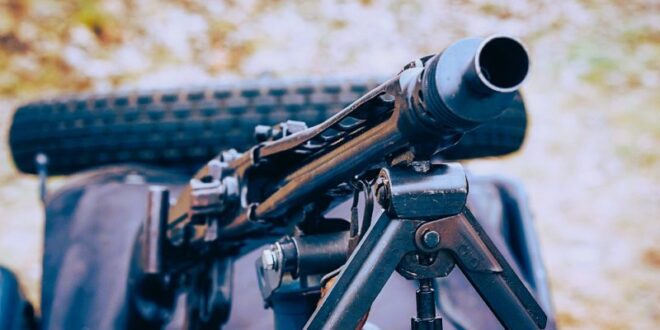Nearly two-thirds of foreign-made components in Russian weapons are produced in or re-exported from China, a senior Ukrainian official said on Tuesday (24 September).
Vladyslav Vlasiuk, an advisor on sanctions policy to President Volodymyr Zelenskyy, told reporters in Brussels that roughly 60% of foreign-made microchips, circuit boards and other critical components used in Russia’s military apparatus, including drones and missiles, are manufactured or re-sold by Chinese firms.
“If you take all the usual types of weapons and count how many foreign-made components are inside, [there] would roughly be around 60% made in the PRC, or imported from the PRC,” he said.
Vlasiuk also warned that EU and US sanctions on Moscow have failed to prevent “a lot” of these components – many of which he said were originally intended for civilian use – from being sourced from Western companies.
“There are a lot of microelectronics […] being made based on Western technologies,” he said, but added “the People’s Republic of China is the biggest problem.”
China, whose total trade with Russia hit a record high of $240 billion last year, has repeatedly been accused by US and European capitals of aiding Russia’s war effort through its sale of “dual-use” and other equipment to Moscow.
In an escalation of such allegations, in July NATO leaders accused China of being a “decisive enabler” of the conflict and urged Beijing to “cease all material and political support to Russia’s war effort”.
On a visit to Brussels this month, US Deputy Secretary of State Kurt Campbell similarly alleged that Beijing is providing “very substantial” military support to Moscow, including “direct support for Russia’s defence industrial base”.
China has denounced the allegations as “biased, slanderous, and provocative”.
Lingering dual use questions
EU sanctions envoy David O’Sullivan told reporters on Tuesday that Brussels is currently “working on” how to better monitor global supply chains to “make sure that [European] products cannot find their way to Russia”.
A report sent to reporters by the Ukrainian Office of the President on Tuesday found that at least six European companies have provided components used in Russian weaponry: Switzerland’s STMicroelectronics and Traco Electronic AG; the Netherlands’ NXP Semiconductor; Ireland’s Taoglas; Germany’s Infineon Technologies AG; and Italy’s Finder.
“I do not question the good faith of the companies that do not wish to see their products used in this way,” O’Sullivan said. “But it is true that once you sell these products to distributors or to third parties, you do not always fully control what happens next.”
Asked whether he thought Chinese firms are similarly acting in good faith, Sullivan said: “I think the answer you would get from the Chinese is they don’t consider these [components] to be dual-use [with both civilian and military applications]: these are normal civilian applications.”
“From our perspective, it’s very clear that though they may appear innocent items, they have a clear military application. And this is what we have tried to persuade [our] Chinese colleagues to understand,” he added.
Since Russia’s full-scale invasion of Ukraine in February 2022, the EU has imposed fourteen rounds of sanctions against the Kremlin, to hinder the country’s ability to source materials to support its war effort.
Its latest package, announced in June, targeted 19 Chinese firms accused of directly “supporting Russia’s military-industrial complex” through the sale of dual-use weapons.
Its thirteenth package, adopted in February, blacklisted four Chinese firms accused of “trading in the area of electronic components, including of EU-origin”.
Tensions between Brussels and Beijing have also flared in recent months amid Brussels’ ongoing anti-subsidy investigation into China-made electric vehicles and Beijing’s retaliatory probes into EU exports of brandy, dairy, and pork.
Ukraine needs ‘more arguments’ to persuade China
Echoing O’Sullivan’s remarks, Vlasiuk noted that Kyiv must find “more arguments” to convince China to cease supplying such compontents. China’s leader, Xi Jinping, declared a “no limits” friendship with his counterpart Vladimir Putin just weeks before Moscow’s charge on eastern Ukrainian borders.
“At some point [in] time, I think that the Chinese government will understand that supplying Russians with these micro-parts […] is something [it] would ideally avoid doing,” Vlasiuk said.
“And we just have to find some – maybe more – arguments for the Chinese government to persuade it.”
Vlasiuk’s comments also come amid an increasingly fractious relationship between Kyiv and Beijing.
On a visit to Singapore in June this year, Zelenskyy publicly rebuked China for attempting to “disrupt” a peace summit in Switzerland at Moscow’s behest.
“Regrettably, it is unfortunate that such a big, independent, powerful country as China is an instrument in [the] hands of [Russian President Vladimir] Putin,” Zelenskyy said.
Earlier this month, the Ukrainian leader also chastised a joint Brazil-China peace plan for ending the war as “destructive”, arguing the proposal effectively called on Kyiv to “give up” its territory.
Commenting on the Ukrainian government’s allegations, Traco Electronic AG said: “Our components are industrial mass-produced goods and are definitely not intended, let alone approved, by us for military use.”
The company added that their “products, which have been used for any purpose in Russia, including used in Russian armament material, cannot originate from our company or our authorised sales channels to Russia since February 28, 2022, the period when sanctions went into effect.”
Infineon said that it had undertaken “extensive” efforts to “comply with the letter [and] also with the spirit of the sanctions” since Russia’s full-scale invasion.
“Infineon stopped all direct shipment to Russia and has taken extensive measures to stop all indirect shipments to Russia immediately after the Russian attack on Ukraine regardless of the legal possibility to continue certain transactions,” it noted.
However, the company warned that it is “difficult to control sales throughout the lifetime of a product,” given that it produces roughly 30 billion chips each year.
 Eurasia Press & News
Eurasia Press & News




